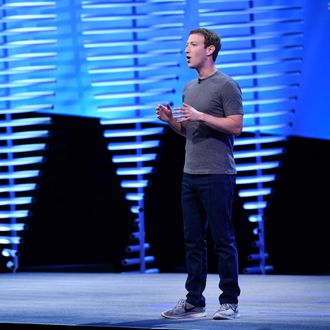
“What responsibility does Facebook have to prevent President Trump in 2017?”
According to Gizmodo, that was one of the questions Facebook employees submitted to company founder and CEO Mark Zuckerberg, ahead of a Q&A session in early March. From the staff of a conventional publisher, this question might seem laudable. Donald Trump is a demagogue who has stigmatized vulnerable minority populations, while voicing contempt for some of the basic norms of our civil society, including freedom of expression and the rule of law. If such a figure starts utilizing a publisher’s platform in his quest for power, it’s reasonable for that company to wonder: “Do we have an obligation to intervene here?”
But Facebook is not a conventional publisher. It is a media platform that curates a global discourse composed and consumed by more than a billion human beings. Its influence is unprecedented in both its scope and invisibility: As Gizmodo’s Michael Nuñez puts it, “with Facebook, we don’t know what we’re not seeing.” Through the fine-tuning of its algorithm, Facebook makes editorial decisions, but without the transparency of a masthead lined with its editors’ names, or editorials that make the publisher’s worldview explicit.
If you have liberal values — in the most expansive sense of the term — you may find the possibility of Facebook actively suppressing Trump less threatening than the possibility of the platform passively abetting his election. (I’m personally sympathetic to this view.)
But what if Facebook came to develop a more expansive sense of its responsibility to police the political discourse that it hosts? Mark Zuckerberg’s keynote speech at Facebook’s F8 conference earlier this week suggests this question may not be an idle one.
“As I look around the world, I’m starting to see people and nations turning inward, against the idea of a connected world and a global community,” Zuckerberg said.
“I hear fearful voices calling for building walls and distancing people they label as ‘others.’ I hear them calling for blocking free expression, for slowing immigration, for reducing trade, and in some cases even for cutting access to the internet,” he said.
“It takes courage to choose hope over fear,” Zuckerberg said, as he began winding down his rant. “People will always call you naïve but it’s this hope and optimism that’s behind every important step forward.”
Here, Zuckerberg conflates political attitudes that directly undermine the foundations of liberal democracy — the stigmatization of out-groups, the embrace of government censorship — with a set of highly contentious policy positions. In elite circles, the desirability of free trade and immigration may seem like dead moral questions, but in the rest of the country they are not. What’s more, Zuckerberg doesn’t just decry the stigmatization of immigrants, or maximally restrictive immigration policies; rather, the CEO characterizes support for “slowing immigration” — advocacy for any rate of immigration more restrictive than the status quo — as an embrace of fear over hope. Zuckerberg has every right to express this view. And personally, I think a world where people could move freely across borders is an ideal worth aspiring toward. But I’m not sure I’d want Facebook feeling a responsibility to prevent the United States from adopting a more restrictive immigration policy.
Zuckerberg’s objection to “reducing trade” inspires similar concerns. For one thing, almost no one is advocating a reduction in trade per se. Donald Trump and Bernie Sanders both claim to support global trade, just not under the rules that currently govern it. If Zuckerberg believes that resistance to the Trans-Pacific Partnership constitutes a rejection of hope, I certainly don’t want Facebook’s algorithm to be influenced by that perspective.
All of which is to say: Facebook has become something approaching a public utility. And the fact that this utility is provided by a private monopoly raises concerns about how it will exercise its power.
Rather than mitigating those concerns, Mark Zuckerberg’s good intentions may actually exacerbate them. The most terrifying words in the English language may prove to be, “I’m from Facebook and I’m here to help.”






























